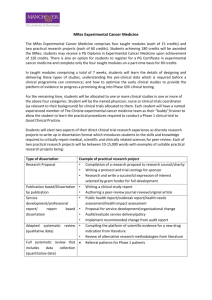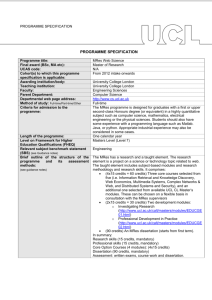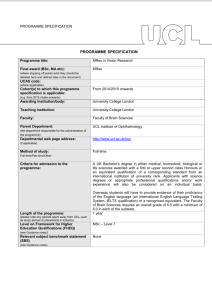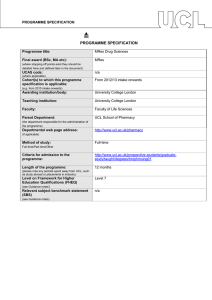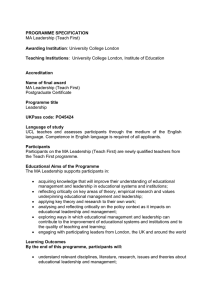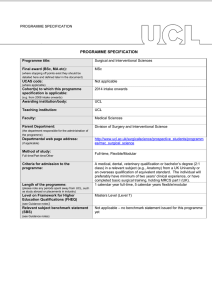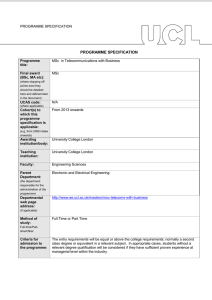Programme title: Final award (BSc, MA etc): UCAS code:
advertisement
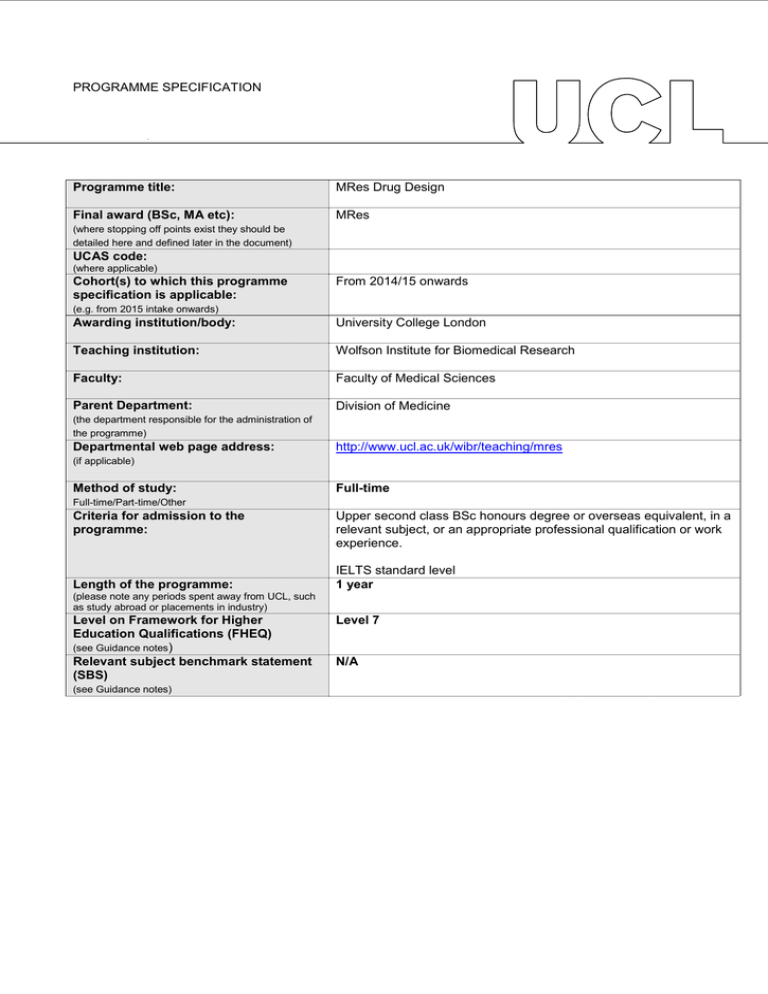
PROGRAMME SPECIFICATION Programme title: MRes Drug Design Final award (BSc, MA etc): MRes (where stopping off points exist they should be detailed here and defined later in the document) UCAS code: (where applicable) Cohort(s) to which this programme specification is applicable: From 2014/15 onwards (e.g. from 2015 intake onwards) Awarding institution/body: University College London Teaching institution: Wolfson Institute for Biomedical Research Faculty: Faculty of Medical Sciences Parent Department: Division of Medicine (the department responsible for the administration of the programme) Departmental web page address: http://www.ucl.ac.uk/wibr/teaching/mres (if applicable) Method of study: Full-time Full-time/Part-time/Other Criteria for admission to the programme: Length of the programme: Upper second class BSc honours degree or overseas equivalent, in a relevant subject, or an appropriate professional qualification or work experience. IELTS standard level 1 year (please note any periods spent away from UCL, such as study abroad or placements in industry) Level on Framework for Higher Education Qualifications (FHEQ) (see Guidance notes) Relevant subject benchmark statement (SBS) (see Guidance notes) Level 7 N/A Brief outline of the structure of the programme and its assessment methods: (see guidance notes) The program will have 3 required taught modules (3x15 credits) from MSc Drug Design (below), 2 modules of taught transferrable skills from CALT (2x15 credits), and a research project module that last 6-7 months (105 credits). The total will be 180 credits. The 8 taught modules are: 1. Bioinformatics and structural biology as applied to drug design 2. The biology of drug discovery programmes: introduction 3. Cheminformatics and modelling for drug design 4. Biological molecules as therapeutics 5. The biology of drug discovery programmes: latest advances 6. Fragment based drug design (FBDD) 7. Target selection based on scientific grounds 8. Target selection – commercial and intellectual property aspects Each of these modules is worth 15 credits and will be assessed by coursework (50%) and two final examinations (50%). The CALT modules are “Investigating Research” and “Researcher Professional development”. The research project module is worth 105 credits. A 15,00020,000 word dissertation (75%) and oral presentation (25%) will be used to assess the research-based project. Board of Examiners: Board of Examiners in MSc Drug Design Professional body accreditation (if applicable): N/A Date of next scheduled accreditation visit: EDUCATIONAL AIMS OF THE PROGRAMME: Our current taught program MSc Drug Design delivers an in depth view of modern drug design. The MRes provides a research focused route for students. Our aims are as follows: Enable students to learn and conduct insightful and independent research Enable students to develop the capability for qualitative and quantitative research methodologies Acquire transferable skills, such as technical writing, presentation. Acquire knowledge of drug design through taught modules. PROGRAMME OUTCOMES: The programme provides opportunities for students to develop and demonstrate knowledge and understanding, qualities, skills and other attributes in the following areas: A: Knowledge and understanding Knowledge and understanding of: All aspects of drug design: genomics, bioinformatics, drug target selection, structural biology, molecular modelling, intellectual property and marketing. Research methods and techniques used in different aspects of drug design. Industrial practices of modern drug design technologies. Teaching/learning methods and strategies: Lectures and cutting-edge lectures (given by industrial and academic experts); tutorials and journal clubs; selfdirected studies; research projects. Students will be required to attend selected classes (3 modules) and study extensively on their own. 1. Bioinformatics and structural biology. 2. Target identification and high throughput screening. 3. Cheminformatics and computer drug design. 4. Biological molecules as therapeutics – antibodies, siRNA, and stem cells. 5. Biophysical screening methods, protein NMR and phenotypic screening. 6. Fragment based drug design (FBDD). 7. Target selection – scientific grounds. 8. Target selection – commercial and intellectual property. Assessment: One written examination, practical and course work (short essays; computational program; literature review and presentation); research project, dissertation and oral presentation. B: Skills and other attributes Intellectual (thinking) skills: Be able to critically read and evaluate scientific literature. Be able to think critically about information and evidence presented and how it fits into the larger conceptual framework. Be able to conceptually design a research project. Be able to critically inspect proteins structures and small molecules and their suitability for the drug design process. Be able to assess a drug target. Teaching/learning methods and strategies: Lectures; seminars; tutorials and problem classes; critical journal clubs; research project. All the taught component will introduce information that will need to be interpreted and critically evaluated. The research project will generate new data. Assessment: Examination, course work, dissertation, oral presentation. C: Skills and other attributes Teaching/learning methods and strategies: Practical skills (able to): Basic computer competency. Proficiency in various types of computer software (e.g. word processing, citation based, spreadsheet, graphical presentations). Discussion and oral presentation skills. Lab work Tutorials, coursework, practicals, and Lab work. Assessment: Tutorials, course work, dissertation, oral presentation. Lab work. D: Skills and other attributes Transferable skills (able to): Basic computer competency. Proficiency in various types of computer software (e.g. word processing, citation based, spreadsheet, graphical presentations). Discussion and oral presentation skills. Writing skill, etc Teaching/learning methods and strategies: Lectures, assignments, preparation of presentations. Preparation of the research project report. Tutorials, course work, dissertation, oral presentation Assessment: Tutorials, course work, dissertation, oral presentation. The following reference points were used in designing the programme: the Framework for Higher Education Qualifications: (http://www.qaa.ac.uk/en/Publications/Documents/qualifications-frameworks.pdf); the relevant Subject Benchmark Statements: (http://www.qaa.ac.uk/assuring-standards-and-quality/the-quality-code/subject-benchmark-statements); the programme specifications for UCL degree programmes in relevant subjects (where applicable); UCL teaching and learning policies; staff research. Please note: This specification provides a concise summary of the main features of the programme and the learning outcomes that a typical student might reasonably be expected to achieve and demonstrate if he/she takes full advantage of the learning opportunities that are provided. More detailed information on the learning outcomes, content and teaching, learning and assessment methods of each course unit/module can be found in the departmental course handbook. The accuracy of the information contained in this document is reviewed annually by UCL and may be checked by the Quality Assurance Agency. Programme Organiser(s) Dr Edith Chan Name(s): Prof David Selwood Date of Production: 25 September 2013 Date of Review: November 2015 Date approved by Chair of Departmental Teaching Committee: November 2015 Date approved by Faculty Teaching Committee November 2015
